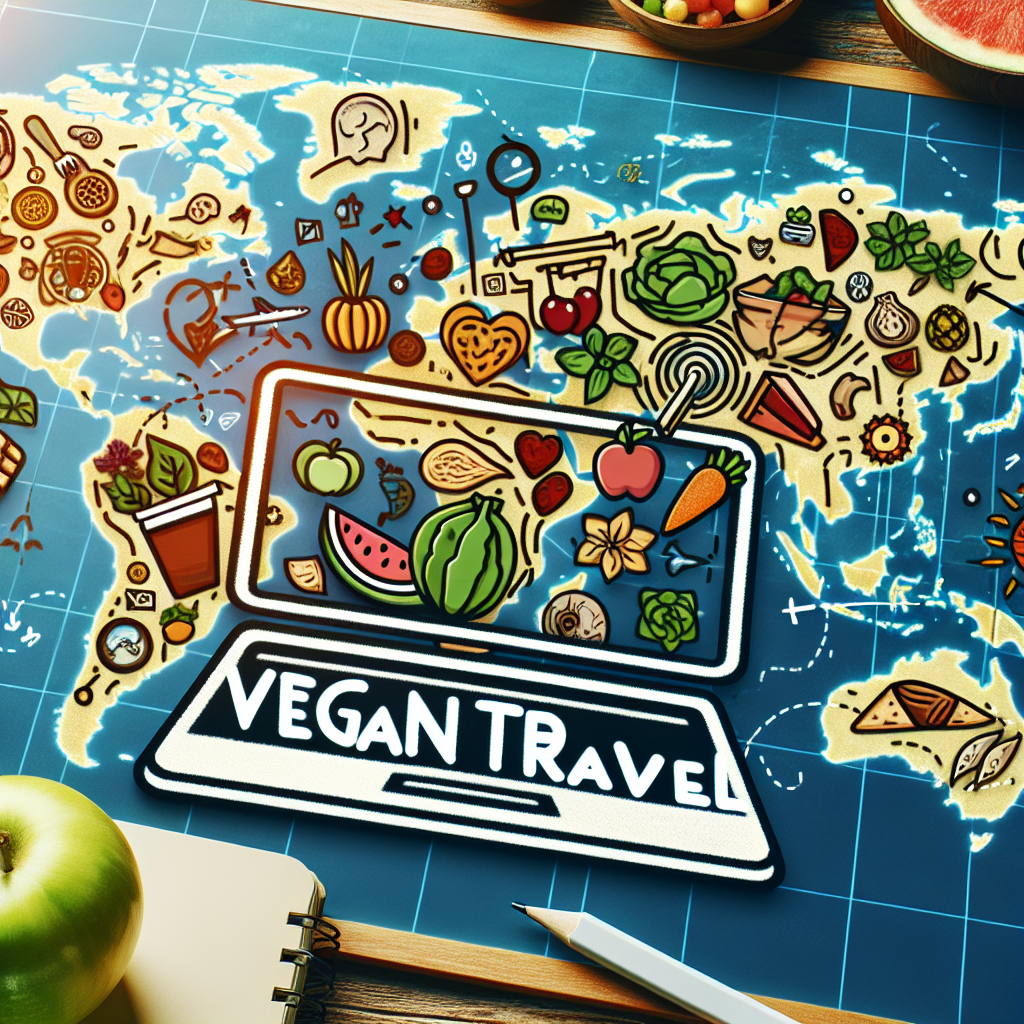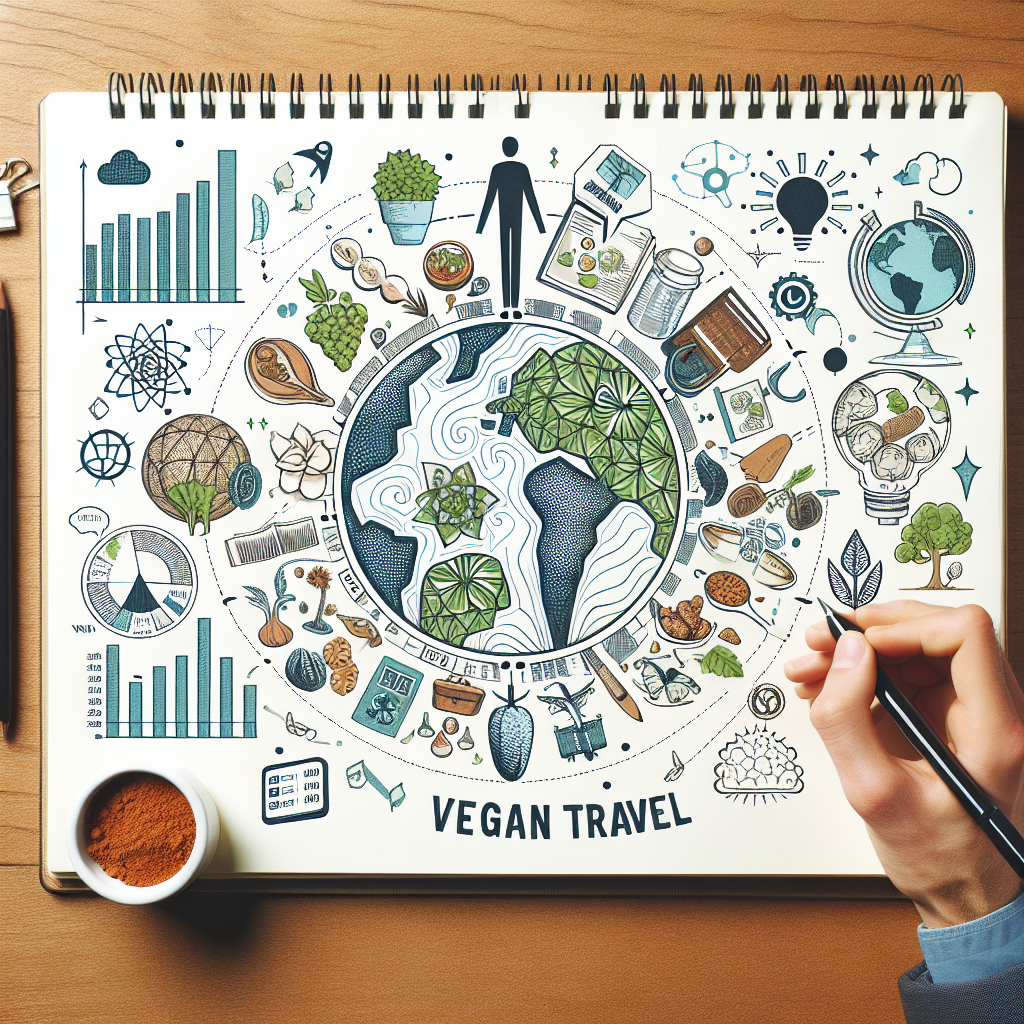Vegan Travel: Introduction
Are you a passionate traveler with a love for delicious, plant-based cuisine? Look no further! In this article, we will explore the wonderful world of vegan travel, where we embark on extraordinary adventures that satisfy not only our wanderlust but also our taste buds. From vibrant cities teeming with vegan-friendly eateries to idyllic destinations boasting farm-to-table dining experiences, we will uncover the best destinations, tips, and tricks for vegans on the go. So pack your bags and join us on this exciting journey of vegan exploration. Bon appétit!
Choosing Vegan-Friendly Destinations
When it comes to planning a vacation as a vegan traveler, it’s essential to select destinations that can cater to your dietary needs and preferences. Researching vegan-friendly destinations is the first step in ensuring a smooth and enjoyable travel experience. Start by looking for cities or countries known for their vegan-friendly options, such as Berlin, Tel Aviv, or Melbourne. These places often have a wide range of vegan restaurants and accommodations that can cater to your needs.
Researching vegan-friendly destinations
Before booking your trip, take the time to research the vegan scene in potential destinations. Look for online resources and forums where travelers share their experiences and recommendations. Websites like HappyCow and VeganTravel can provide valuable information about vegan restaurants, markets, and other vegan-friendly establishments in various cities around the world. Reading reviews and checking out social media groups dedicated to vegan travel can also give you a sense of the vegan options available at your chosen destination.

Looking for vegan accommodation options
Finding vegan-friendly accommodations is another crucial aspect of planning your trip. Look for hotels, guesthouses, or Airbnb rentals that advertise vegan or plant-based options. Many accommodations now offer vegan breakfast options or have vegan-friendly restaurants nearby. Additionally, consider reaching out to vegan travel agencies or tour operators who specialize in organizing trips for plant-based travelers. These agencies can help you find accommodations that align with your lifestyle and cater to your dietary requirements.
Considering local cuisine options
One of the highlights of traveling as a vegan is the opportunity to explore local cuisine and try new dishes. While some destinations may not be traditionally known for their vegan options, it’s crucial to remain open-minded and willing to explore local culinary traditions. Research and familiarize yourself with traditional dishes that can be made vegan or have vegan variations. By doing so, you can experience the local culture and flavors while still adhering to your dietary choices.

Finding Vegan Restaurants
When it comes to finding vegan restaurants in your chosen destination, there are several strategies you can employ to discover the best options available.
Using online resources
Harness the power of the internet to find vegan restaurants in the area you’ll be visiting. Websites like HappyCow, Yelp, and Google Maps offer comprehensive listings of vegan and vegan-friendly restaurants worldwide. These platforms allow you to filter results by location, cuisine, and reviews, ensuring that you can find the best vegan spots wherever you go.

Utilizing vegan travel apps
In addition to online resources, there are several vegan travel apps available that can assist you in finding vegan restaurants on the go. Apps like Vanilla Bean, Vegman, and HappyCow offer user-friendly interfaces and comprehensive databases to help you locate vegan eateries near your current location. These apps often include reviews, menus, and directions, making it convenient for you to find delicious vegan options while exploring a new city.
Vegan Travel: Asking for recommendations
Don’t underestimate the power of personal recommendations when it comes to finding vegan restaurants. Reach out to local vegan communities or even use social media platforms like Facebook or Instagram to ask for recommendations from fellow vegans or locals. Often, people are more than happy to share their favorite vegan-friendly spots and hidden gems. This approach can lead you to special places that may not have been on your radar.

Planning Vegan-Friendly Activities
While exploring the vegan food scene is a fantastic way to immerse yourself in a new culture, there are plenty of other vegan-friendly activities that can enhance your travel experience.
Exploring local vegan markets
One of the best ways to get a taste of the local vegan scene is by visiting vegan markets or farmer’s markets that offer plant-based options. These markets often feature a variety of vegan products, from fresh produce to baked goods and culinary specialties. Exploring these markets not only allows you to support local vendors but also gives you an opportunity to interact with the community and learn more about their food culture.

Visiting animal sanctuaries
For any animal lover, visiting animal sanctuaries can be a heartwarming and enlightening experience. Many destinations around the world have sanctuaries that rescue and care for animals, providing them with a sanctuary where they can live out their lives in peace. These sanctuaries often offer educational tours and opportunities to interact with the animals, allowing you to deepen your understanding of animal welfare while supporting a worthy cause.
Taking vegan cooking classes
If you’re interested in diving deeper into the local cuisine, taking vegan cooking classes can be an enriching experience. Many destinations offer vegan cooking classes where you can learn to prepare traditional dishes using plant-based ingredients. Not only will you gain new culinary skills, but you’ll also have the opportunity to connect with local chefs and learn about the cultural and historical significance of the dishes you’re preparing.
Navigating Language Barriers
Language barriers can sometimes pose a challenge for vegan travelers, especially when trying to communicate specific dietary requirements or inquire about vegan options. However, with a little preparation and resourcefulness, you can overcome these challenges.
Learning key phrases in the local language
Before embarking on your vegan travel adventure, take some time to learn key phrases in the local language that can help you navigate food-related conversations. Phrases such as “Is this vegan?” or “I am vegan, do you have any vegan options?” can be invaluable when communicating your dietary needs to locals. Utilize language-learning apps or phrasebooks specific to the language spoken at your destination to familiarize yourself with essential phrases.
Using translation apps
Translation apps can be a lifesaver when facing language barriers. Download a reliable translation app that offers offline functionality, so you won’t be reliant on an internet connection. These apps allow you to type or speak phrases and have them translated in real-time, making it easier to communicate your vegan needs to servers or locals who may not speak English.
Seeking Assistance from Vegan Online Communities
In our digitally-driven age, vegan online communities have become invaluable resources for travelers facing language barriers. These forums are treasure troves of shared experiences, tips, and practical advice, especially for vegans journeying to unfamiliar destinations. They’re not just about overcoming language hurdles; they also offer insights into local vegan-friendly restaurants, shops, and cultural nuances.
Imagine you’re planning a trip to a country where you don’t speak the language. In such cases, vegan online communities can be a lifeline. Members who’ve been to your destination can provide firsthand experiences, recommend vegan-friendly eateries, and even help translate menus. These communities often compile lists of vegan-friendly restaurants or stores in various locations, which can be incredibly useful.
Moreover, these forums are more than just information hubs; they’re platforms for empathy and support. Connecting with others who understand the challenges and joys of vegan travel fosters a sense of belonging and community. You’re not just getting tips and tricks; you’re becoming part of a global network of individuals who share your values and lifestyle.
Packing Essentials for Vegan Travelers
For vegan travelers, efficient packing goes beyond the usual travel checklist. It involves a thoughtful inclusion of items that align with vegan values and ensure convenience. Here are some essentials to consider:
- Vegan Snacks: Always carry a variety of vegan snacks. These can be lifesavers, especially in areas where vegan options might be scarce.
- Supplements: Pack any necessary supplements, like B12, which are crucial for maintaining a balanced vegan diet.
- Reusable Utensils and Containers: Include eco-friendly, reusable utensils, water bottles, and containers to minimize waste and ensure you’re always prepared for meals on the go.
- Vegan Toiletries: Don’t forget personal care items like vegan and cruelty-free shampoo, soap, and sunscreen. These might be hard to find in certain destinations.
- Translation Cards or Apps: Have cards or apps handy that can translate your dietary needs into the local language. This will be incredibly helpful in restaurants and markets.
- Vegan Leather Travel Goods: Opt for luggage and accessories made from vegan leather or other cruelty-free materials.
- Cooking Essentials: If you plan on cooking, consider packing some essential vegan cooking ingredients that might not be easily available, like nutritional yeast or specific spices.
- Local Vegan Guides: Research and bring along guides or apps that pinpoint vegan-friendly establishments in your destination.
FAQ Section
How Can I Find Vegan Restaurants in a Non-English Speaking Country?
Finding vegan restaurants in non-English speaking countries can be a challenge, but with the right tools and strategies, it’s entirely manageable. Start by utilizing vegan restaurant finder apps and websites, which often have extensive databases of vegan and vegetarian restaurants worldwide. These platforms are regularly updated and can be filtered by location. Additionally, join local vegan social media groups or forums; members often share their favorite spots and might offer to guide or accompany you. Don’t forget to use translation apps or vegan-specific translation cards to communicate your dietary preferences effectively in local eateries.
Is It Difficult to Maintain a Vegan Diet While Traveling?
Maintaining a vegan diet while traveling can present challenges, but it’s definitely feasible with preparation and flexibility. Research your destination beforehand to identify vegan-friendly restaurants and grocery stores. Packing vegan snacks and essentials can tide you over during your journey. In destinations where vegan options are limited, learning some local language phrases to explain your dietary preferences can be invaluable. Additionally, consider staying in accommodations with kitchen facilities so you can prepare your own meals if needed.
What Are Some Tips for Communicating Vegan Needs in a Foreign Language?
Communicating vegan needs in a foreign language involves a bit of preparation. Before your trip, learn key phrases in the local language that explain your diet. Phrases like “I don’t eat meat, dairy, or eggs” can be more effective than just saying “vegan,” which might not be a well-understood term everywhere. Carry translation cards or use translation apps dedicated to conveying dietary restrictions. Additionally, familiarize yourself with local vegan-friendly ingredients and dishes, so you know what to look for on menus.
Can I Find Vegan Supplements and Toiletries Easily Abroad?
The availability of vegan supplements and toiletries varies greatly depending on your destination. In some countries, especially those with a burgeoning vegan movement, you might find these items easily in health food stores or supermarkets. However, in others, they might be rare or nonexistent. It’s best to pack enough of your essential supplements and toiletries to last your trip. You can also research online for local vegan or health stores in the area you’re visiting.
Are There Any Specific Health Concerns for Vegans When Traveling?
Vegans should be mindful of maintaining a balanced diet while traveling, ensuring they get enough protein, vitamins, and minerals. This can be challenging in destinations with limited vegan food options. Carrying supplements, like Vitamin B12, Vitamin D, and Omega-3, which might be harder to obtain from plant-based sources, is a good idea. It’s also important to be cautious with street food or unfamiliar dishes, as they might inadvertently contain animal products or cause foodborne illnesses.
How Do I Handle Social Situations Involving Non-Vegan Foods While Traveling?
Handling social situations involving non-vegan foods while traveling requires a blend of tact and firmness. Communicate your dietary preferences clearly but respectfully. It’s helpful to learn about local customs and etiquette around food to navigate these situations sensitively. Offering to share your vegan food or suggesting vegan-friendly dining options can be a good way to bridge the gap. Always remember, being polite and understanding of cultural differences goes a long way in such scenarios.
What Should I Do If There Are No Vegan Options Available?
If you find yourself in a place with no apparent vegan options, getting creative with what’s available can help. Look for side dishes, salads, or even plain rice and vegetables, which can be found in most places. Don’t hesitate to ask the chef or restaurant staff if they can prepare a simple vegan dish; often, they are willing to accommodate. Additionally, visiting local markets to purchase fresh fruits, vegetables, and grains can be a great way to ensure you have vegan options.
How Can I Ensure My Vegan Diet is Balanced While Traveling?
Ensuring a balanced vegan diet while traveling requires some planning. Prioritize a variety of foods to get a range of nutrients. Focus on whole foods like fruits, vegetables, grains, nuts, and seeds. Carry supplements for nutrients that are harder to source, like B12. When eating out, look for meals that include a good balance of protein, carbohydrates, and fats. And finally, don’t forget to stay hydrated and listen to your body’s needs.
What Are the Best Ways to Connect with Local Vegans While Traveling?
Connecting with local vegans can enhance your travel experience. Use social media platforms and vegan forums to find local vegan groups or events. Attend vegan meetups, cooking classes, or food festivals. These gatherings are great opportunities to meet like-minded individuals and learn about vegan options in the area. Additionally, staying at eco-friendly or vegan-friendly accommodations can also connect you with local vegan communities.
Can Vegan Travelers Participate in Local Food Cultures Without Compromising Their Diet?
Vegan travelers can absolutely participate in local food cultures without compromising their diet. Many cultures have traditional plant-based dishes that are inherently vegan or can be easily adapted. Research the local cuisine beforehand to identify vegan-friendly options. Don’t hesitate to ask local vegans for recommendations on how to experience the best of the local food culture. Trying vegan versions of traditional dishes can be a unique and satisfying way to immerse yourself in the local culinary scene.
Vegan Travel: Conclusion
Vegan travel, while challenging in certain aspects, is an enriching and feasible endeavor. With the right preparation, knowledge, and tools, vegans can navigate dietary challenges, immerse themselves in new cultures, and maintain their lifestyle with ease and enjoyment. The key is to plan ahead, be flexible, and embrace the adventure that comes with discovering vegan-friendly experiences around the world. Connecting with local and online vegan communities can provide invaluable support and enhance the travel experience. By being prepared and open-minded, vegan travelers can explore the world without compromising their values, contributing positively to sustainable and compassionate tourism.




